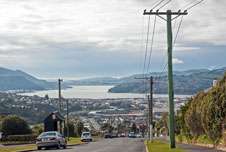Opportunities to improve Dunedin's energy efficiency

Dunedin residents are still far from efficient with their use of energy, a University of Otago Centre for Sustainability study says.
The Dunedin Energy Study 2015-2016, a collaboration between the University and the Dunedin City Council (DCC), which funded it, has found only 37 per cent of energy consumption in the city came from renewable resources, three percentage points lower than the comparable nationwide figure.
In Dunedin, 42 per cent of this renewable energy came from wood fuels and the remainder from renewable sources of electricity.
Otago fourth-year Commerce student Olive Dippie produced the report while on a summer scholarship, supervised by Centre for Sustainability's Director Dr Janet Stephenson and the University's Energy Management Programme Director Dr Michael Jack.
Dr Jack says very few, if any, similar studies have been carried out in New Zealand.
"The DCC is leading the way here in trying to measure the city's energy use."
Ms Dippie says pulling all the data together was a "huge exercise".
"We are really thankful for the assistance from businesses and government agencies, which all provided pieces of the puzzle."
The 2015-16 study follows a baseline energy report which took stock of consumption in 2014. Direct comparisons of trends will be possible once the 2016-17 report is published next year.
Ongoing annual studies will provide robust data for Dunedin's Energy Plan.
According to the latest study, Dunedin's total energy use during the financial year ending 30 June 2016 was 13.24 PJ (petajoules).
During the same period, that energy released 654 kilotonnes of greenhouse gases – 75 per cent from petrol and diesel, 16 per cent from electricity, 7 per cent from coal and 2 per cent from wood.
Dr Stephenson says the report shows there is room for improvement when it comes to the size of Dunedin's energy footprint.
"Transport fuels account for half of Dunedin's energy use and three-quarters of Dunedin's energy-related greenhouse-gas emissions. This is the biggest area for action if we want to improve efficiency, productivity, health and emissions.
"Moving away from petrol and diesel vehicles to electric vehicles, more cycling and walking, e-bikes, better use of public transport – all of these have multiple benefits for users and the wider community."
Dr Jack says coal use is also a grey area.
"Only about 60 households still use coal as their sole heating fuel, but another 4,600 occasionally use it.
"We now know that about 30 Dunedin schools also use coal for heating, which isn't ideal because it not only produces high levels of greenhouse gases but also produces particulate emissions that can have serious health impacts.
"But some schools are converting to modern wood-fuelled boilers, which is excellent news."
DCC Corporate Policy Advisor Jessie Wu says the key goals of the city's Energy Plan 1.0 relate to improvements in energy efficiency and adapting to change.
"Having an understanding of what is going on currently with Dunedin's energy use is important when it comes to figuring out what has to change."
The Dunedin Energy Study also helps the DCC meet its Compact of Mayors agreement, signed at the end of 2015, to be part of a global coalition of city leaders tackling climate change.
"Cities are required to produce a community carbon footprint showing the emission sources of the city, and the Dunedin Energy Study provides some of the data for our city's energy use.
"The compact requires an updated footprint every few years, and so the continuation of the study is important in contributing to our commitment," Ms Wu says.
Provided by University of Otago




















